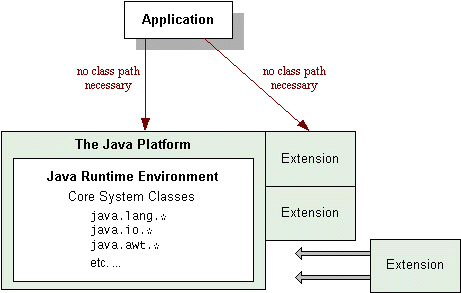Feedback Form
|
|
Start of Tutorial |
Search
Feedback Form |
The extension mechanism is a new feature in the JavaTM 1.2 platform. The extension mechanism provides a standard, scalable way to make custom APIs available to all applications running on the Java platform.
Extensions are groups of packages and classes that augment the Java platform through the extension mechanism. The extension mechanism enables the runtime environment to find and load extension classes without the extension classes having to be named on the class path. In that respect, extension classes are similar to the Java platform's core classes. That's also where extensions get their name -- they, in effect, extend the platform's core API.

As the diagram indicates, extensions act as "add-on" modules to the Java platform. Their classes and public APIs are automatically available to any applications running on the platform.
The extension mechanism also provides a means for extension classes to be downloaded from remote locations for use by applets.
Extensions are bundled as Java Archive (JAR) files, and this trail assumes that you are familiar with the JAR file format. If you're not up to speed on JAR files, you might want to review some JAR-file documentation before proceeding with the lessons in this trail:
This trail has two lessons:
![]() Creating and Using Extensions
shows you what you need to do to add an extension to your Java platform
and how applets can benefit from the extension mechanism by
downloading remote extension classes.
Creating and Using Extensions
shows you what you need to do to add an extension to your Java platform
and how applets can benefit from the extension mechanism by
downloading remote extension classes.
![]() Making Extensions Secure shows you how to control the
security privileges and
permissions that are granted to extensions on your platform. You'll
see how to use the Java platform's security architecture if you're writing
extensions classes of your own.
Making Extensions Secure shows you how to control the
security privileges and
permissions that are granted to extensions on your platform. You'll
see how to use the Java platform's security architecture if you're writing
extensions classes of your own.
|
|
Start of Tutorial |
Search
Feedback Form |
Copyright 1995-2002 Sun Microsystems, Inc. All rights reserved.